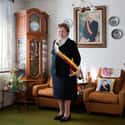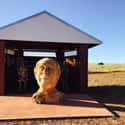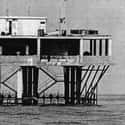-
(#1) The Nation Of Celestial Space: One Man’s Attempt To Monetize The Heavens
Established in 1949, the Nation of Celestial Space claims the entirety of outer space as the property of Chicago resident James T. Mangan. The idea for a celestial nation came to Mangan during an evening of idle conversation with his partner, Ernest Eckland. Reportedly, Eckland gestured out the window and noted that there was “plenty of stuff out there.” This ordinary sentiment caught fire in Mangan’s mind, as he smiled and replied, “I wonder who owns it?” Soon after staking his claim, Mangan drew national attention when he presented the “Charter of Celestia” to the Cook County Recorder of Deeds, and with a fair bit of struggle, got the state of Illinois to accept it.
Mangan fought the rest of his life to gain international recognition for his claim, but it never happened. The United Nations denied his application, and 74 secretaries of state ignored his persistent letters. But Mangan was skilled at self-promotion and managed to keep the Nation of Celestial Space in the public eye for decades. He issued outer space postage stamps and offered to sell plots of outer space "land" for a dollar each. Mangan even minted his own gold currency called “Celestons,” which featured his daughter’s profile, whom he considered “the pleasantest person in the universe.” Although Mangan left the nation to his children and grandchildren, the UN later declared that no nation could claim sovereignty over outer space or celestial bodies, effectively putting an end to the once proud Nation of Celestial Space.
-
(#2) The Royal Republic Of Ladonia: Sweden’s Secret Driftwood Kingdom
In 1980, Swedish artist Lars Vilks began an art project that would one day become his very own micronation. Using stones and recovered driftwood, Vilks secretly started building elaborate structures in a remote region of the Kullaberg nature reserve in southern Sweden. The makeshift towers were never intended as actual buildings, but when local authorities discovered the secret sculptures two years later, they ordered Vilks to dismantle what they viewed as illegal dwellings. Vilks fought the decision over the course of a 14-year legal battle, all the while continuing to expand his sculptures in secret. The dispute was finally resolved in 1996 when the courts ruled that Swedish authorities did not actually have jurisdiction over the territory where the sculptures had been built. Vilks saw the ruling as a unique opportunity to both protect his artwork and prevent future legal entanglements. On June 2, 1996, he declared the Royal Republic of Ladonia as an independent nation.
Ladonia’s founder was its only citizen at first, but the nation has since grown to include over 17,000 citizens from more than 50 countries. As is the case for most micronations, Ladonian citizenship is largely symbolic. No one actually lives within the country’s borders, but anyone can visit Ladonia if they are intrepid enough to find it. Sweden has yet to recognize Ladonia as an independent nation, so it can’t be found on any signs or maps. Instead, would-be visitors must find a winding footpath and follow it to the rocky coastline where the enormous wooden sculptures reside.
-
(#3) The Principality Of Sealand: The Artificial Island In International Waters
Founded as a sovereign Principality in 1967, Sealand is one of the most successful and recognizable micronations in the world. The 120-by-50-foot country rests atop a repurposed anti-aircraft gun platform seven miles off the eastern shores of Britain. Its founder, Paddy Roy Bates, was familiar with the abandoned platform from his days as a British Army major. He took up residence on the artificial island in 1966 and began transmitting pirate radio broadcasts from the safety of international waters. A year later, the enterprising Bates declared the platform his own nation, and his family has maintained control of it ever since.
Despite a tense relationship with Great Britain, which still refuses to acknowledge Sealand, the floating micronation has done quite well for itself. Now under the leadership of the founder’s son, Prince Michael, Sealand has found great commercial success by issuing its own commemorative coins, stamps, and even titles of nobility.
Like any country worth its salt, Sealand also has its own share of scandals. In August 1978, a political coup was launched by the self-proclaimed Prime Minister of Sealand while the rulers were away in England. He hired German and Dutch mercenaries to storm Sealand using helicopters and jet skis and take Bates’s son as a hostage. Fortunately, the Bates boy was able to use weapons stashed around the platform to fight off the attackers and return Sealand to its rightful rulers.
-
(#4) The Principality Of Wy: The Australian Nation That Seceded Over A Driveway
In 1993, an artist named Paul Delprat applied for permission to build a concrete driveway on a strip of public land near the Wyargine Reserve in the Mosman suburb of Sydney, Australia. After 11 years and countless applications rejected or ignored, Delprat decided to secede from Mosman and create his own principality instead. "I was citizen of the year here,” Delprat said, “All I wanted was a drive."
On November 15, 2004, Delprat held a ceremony at Mosman Town Hall to announce the secession of the Principality of Wy, named for the nature reserve behind his house. Today, the population of the Principality consists of Prince Paul, Princess Susan, their three children, and their pets. The principality has become famous for its support of the arts, including its sponsorship of The Archy Wyld Art Award. Although the official award judge is Prince Paul, he is assisted by Archy Wyld, a ringtail possum who lives on the property and is said to ring a little bell on his tail when he sees a work of art he likes.
-
(#5) The Kingdom Of Talossa: The Childhood Bedroom Turned Sovereign State
Founded by a Milwaukee, WI, high school student, the Kingdom of Talossa is one of the earliest conceptual micronations and one of the first to establish a web presence. The birth of Talossa, from a Finnish word meaning "inside the house," can be traced back to December 26, 1979. That was the day when 14-year-old Robert Ben Madison first declared his second-floor bedroom to be an independent nation.
Madison, now going by King Robert I, continued to develop his kingdom throughout adolescence. He designed a flag and coat of arms, started a national newspaper, claimed additional territory east of the Milwaukee River, and admitted a few friends and family members as the first citizens of Talossa. Madison took his micronation a step further than most by inventing a new language for his citizens to speak. Known as Talossan, it is one of the most extensive fictional languages ever devised, boasting a dictionary with more than 28,000 entries.
-
(#6) The Republic Of Saugeais: The Tiny Nation With A Big Sense Of Humor
While plenty of micronations struggle to be taken seriously, only one was founded on a joke. In 1947, a government official was visiting the small community of Montbenoît for an official event. While having lunch at the local hotel restaurant, the official was approached by George Pourchet, the owner. Pourchet quickly built up a rapport with his customer and asked him, “Do you have a passport to enter Saugeais?” The official was bewildered and asked the owner to explain what Saugeais was. Pourchet kept the joke going by making up details about the place on the spot. The official caught on to the joke, telling Pourchet, “It looks like a Republic, but a Republic needs a President so I declare you the President of the Republic of Saugeais."
Georges Pourchet served as President of the Republic of Saugeais until his death in 1968. His wife was elected as his successor in 1972. Her election took place at a party for all the citizens of Saugeais, and the results were determined using an applause meter. Today, the 11 towns that make up the Republic of Saugeais have become popular tourist destinations for those looking to sample the local delicacies and pick up some official Saugeais stamps.
-
(#7) Pitcairn Islands
- Oceania
In 1789, some crewmen on the HMS Bounty staged a mutiny. They took control from Captain William Bligh and steered the ship toward Tahiti instead of England. After the mutiny, Bligh made it back to England and convinced the government to dispatch a ship to capture the mutineers. Little did they know that some of the crewmen had not returned to Tahiti as planned but instead had hidden on a tiny island in the south Pacific called Pitcairn.
Today, the island is mostly inhabited by the descendants of these mutineers. Although Pitcairn Island is officially an unincorporated territory of the United Kingdom, it has its own constitution and is allowed to operate legally as a democracy with the town mayor serving as the de facto ruler. With a total population of about 50 people, Pitcairn Island is the world’s smallest democracy.
-
(#8) Principality of Hutt River
- Australia
One of the most well-known micronations, the Principality of Hutt River, was established in 1970 by a disgruntled Australian farmer named Leonard Casley. The nation was founded in response to harsh restrictions on the amount of wheat that farmers in Western Australia were allowed to sell. Casley fought the wheat quotas in court, but when his efforts failed, he turned to an obscure law that allowed British colonies to secede in extreme circumstances. Casley soon declared his 29-square-mile farmland to be his own independent nation: The Principality of Hutt River.
Today, Casley continues to rule what is sometimes called “the second largest country on the continent,” issuing collectibles and conferring citizenship for a small fee. Although the Australian government has never acknowledged the Principality of Hutt River, the tiny nation recently had its closest brush with legitimacy thanks to Australia’s head of state, Queen Elizabeth II. In April 2016, Casley received a letter from Buckingham Palace that reads, “I am to convey Her Majesty’s good wishes to you and to all concerned for a most enjoyable and successful celebration on 23rd and 24th of April to mark the forty-sixth anniversary of the Principality of Hutt River.”
-
(#9) The Kingdom Of Elleore: The Island Vacation Micronation
The uninhabited island of Elleore off the east coast of Denmark was purchased by a group of progressive schoolteachers (called "The Immortals") in the 1940s. The group first used the tiny island as a summer retreat for their students, during which time they half-jokingly proclaimed its independence in a loving parody of Denmark’s traditionally splintered government structure.
Over the years, Elleore has developed several unusual traditions of its own, including inexplicable bans on canned sardines and the novel Robinson Crusoe, as well as the use of “Elleore Standard Time,” which runs 12 minutes behind Danish time. The most popular Elleore tradition is Elleuge, or “Elle-week.” This is the one week of the year when Elleore is actually habited, as hordes of citizens gather on the island to elect a new ruler, or vote to keep the current one. They also enjoy picnics, camping, and a rousing game of “cracket” – a sport of their own invention. The Elleorians, as they prefer to be called, like to think of this ritual as returning home after a 51-week holiday abroad.
-
(#10) The Kingdom Of North Dumpling: The Nation That Segway Built
Dean Kamen is best known as the inventor of the Segway, but he’s also the self-proclaimed ruler of a two-acre island off the coast of Connecticut. Kamen hoped to power the home on his private island by installing a wind turbine, but his permits were denied. Miffed by the government’s decision, Kamen half-jokingly announced his secession from the United States and the establishment of the Kingdom of North Dumpling in 1988. The secession was never legally recognized, but Kamen did sign a “non-aggression” pact with President George H. W. Bush. The Kingdom of North Dumpling even has its own constitution, currency, flag, and national anthem. Despite having a “navy” in the form of a single boat, the official vehicle of North Dumpling is, of course, the Segway.
-
(#11) The Republic Of Rose Island: The Only Micronation To Be Blown To Bits
In the late 1960s, Italian engineer and real estate investor Giorgio Rosa funded the construction of a 4,300 square-foot platform in the Adriatic Sea. Built on enormous pylons about seven miles from the Italian town of Rimini, the platform was intended to be a tourist destination, complete with a restaurant, nightclub, souvenir shop, and a fishing pier. Shortly after the platform opened, Rosa decided he would attract more customers if he were to declare independence. He named the platform “The Republic of Rose Island” and began issuing postage stamps commemorating the new nation.
However, when Rosa soon started talking about plans to produce his own currency, the Italian government began to suspect that Rosa’s republic was little more than an elaborate scheme to profit from tourism while avoiding taxes. The Italian Navy took control of the platform, evicted Rosa and his employees, and ultimately blew up the facility with explosives on February 13, 1969, in what Rosa ruefully referred to as "the only war that Italy has ever won."
Down but not out, Rosa continued to act as President of his "government in exile" and began selling a new postage stamp depicting the destruction of Rose Island.
-
(#12) The Grand Duchy Of Westarctica: How A Legal Loophole Left The Antarctic Up For Grabs
Travis McHenry is an American entrepreneur who used a loophole in the Antarctic Treaty - which stipulates that no new claims to Antarctic land may be made by any nation - to establish a micronation on Antarctica. In 2001, McHenry decided to claim some Antarctic land as an individual and then establish a nation there. When letters describing his intentions went unanswered by the governments of all the signing nations of the Antarctic Treaty, McHenry took their silence as a blessing to move forward with his country. He quickly set about issuing collectors coins and stamps for what he dubbed the Grand Duchy of Westarctica. Since then, the desolate micronation has changed hands a few times with McHenry eventually leaving to establish a 9.5-square-mile micronation within the state of California.
New Random Displays Display All By Ranking
About This Tool
The last line of the mailing address is usually the country where we are located, such as China or the United Kingdom. But for some people, their country cannot be found in the international postal system, such as Abkhazia and Trans-Dniester. There are still a few regions in the world that claim national sovereignty but are not recognized by the international community.
These micronations are usually the result of wars and conflicts. Although they exist on the map, they are not recognized as independent countries and are not members of international organizations. The random tool introduced 12 micronations in human history you may not know.
Our data comes from Ranker, If you want to participate in the ranking of items displayed on this page, please click here.






















